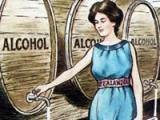Fifty years of six o’clock closing of pubs had ended two days earlier, after a referendum convinced the government to change the antiquated licensing law.
Prohibition
Events In History
A special liquor referendum initially gave prohibition a majority of 13,000 over continuance (the status quo), raising the hopes of those who had for decades campaigned against the manufacture and sale of alcohol.
Prohibition supporters presented Parliament with a petition containing more than 240,000 signatures demanding an end to the manufacture and sale of alcohol in New Zealand.
Articles
Temperance movement

Temperance was one of the most divisive social issues in late-19th and early-20th century New Zealand. Social reformers who argued that alcohol fuelled poverty, ill health, crime and immorality nearly achieved national prohibition in a series of hotly contested referendums. Read the full article
Page 4 - Voting for prohibition
The First World War period brought total or partial prohibition to several countries: New Zealand came within a whisker of joining
Page 5 - The decline of prohibition
Alcohol remained an important issue after the war, and the prohibitionists slogged it out with the liquor trade throughout the 1920s.
Page 6 - Masterton under no-license
The November 1908 licensing poll saw Masterton electorate introduce ‘no-license' and vote itself ‘dry’. Its 15 pubs closed on 1 July 1909, and remained closed until the town voted
The 1920s
The 1920s was the decade that modern New Zealand came of age. Despite political and economic uncertainty, the country shrugged off the gloom of war to embrace the Jazz Age - an era of speed, power and glamour. Explore an overview of the decade and a year-by-year breakdown of key events. Read the full article
Page 5 - 1922 - key events
A selection of key New Zealand events from
























